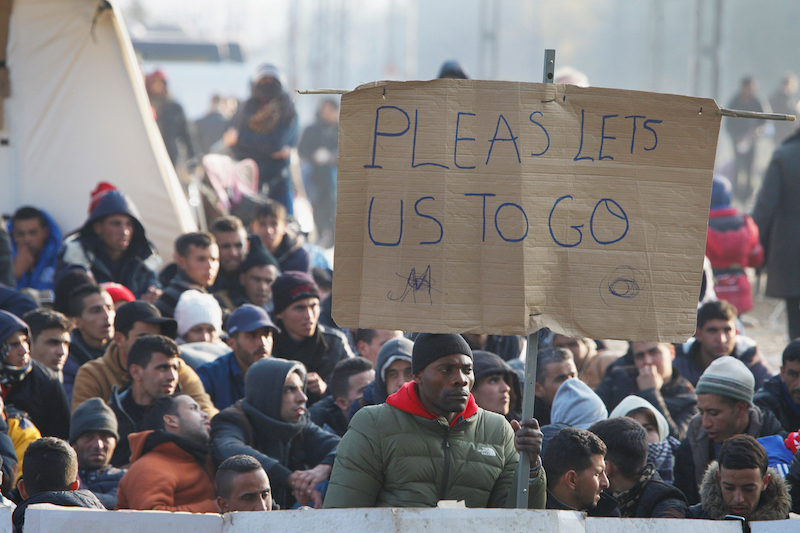Much has been said about the effectiveness of ISIS’s social media propaganda and Internet recruiting techniques, but the organization has also shown keen insight in other, more traditional formats. Dabiq is ISIS’s multi-language magazine directed at the West, having released nine issues since its debut in July 2014, and directed at potential jihadists with ebullient prose on ISIS’s cause. The name comes from the Qu’ran, referring to the location of the final apocalypse where the “Crusaders” – the enemies of Islam will finally be destroyed. Dabiq portrays ISIS’s campaigns in staunch Manichean terms: President Barack Obama is a “failed crusader”, those that opened fire at the Mohammed cartoon contest in Texas are “brothers amongst the leaders of the shuhada [martyrs]”, and other Arab entities such as Syria and al-Qaeda are “apostates.” Much is devoted to the accusations and conspiracies of the “kuffar”, a derogatory term for non-Muslims who conspire against the Islamic State.
But in many ways Dabiq is more sophisticated than usual propaganda pieces that continuously bash opponents. Foremost is the high quality of the magazine. It is professional and glossy, with high-quality editing, “editor’s footnotes”, and clear language almost free of spelling and grammatical errors. Within the most recent edition released in May (publishing dates use the Islamic calendar, making it Sha’ban 1436), the articles range from obituaries, to in-depth portrayals of the minutiae of jihadi life, to interviews with an ISIS commander.
Some articles are very opaque in their propaganda. In “Healthcare in the Khilafah” the four-page exposé describes the new Islamic State-sponsored medical colleges, with a descriptive list of all recent patient operations, including the total number of surgeries to 442 kidney dialysis sessions. Dabiq praises ISIS for a new “practice-oriented curriculum” in contrast to the “taghut [idolatry] sponsored pseudo sciences such as ‘culture’” that plagued the old, supposedly ineffective healthcare system. Concluding that “the Islamic State offers everything that you need to live and work here, so what are you waiting for?”, the article reveals itself as an exaggerated advertising piece to attract new members.
Yet other articles are more subtle in their approach. “Interview with the Amir of the Yarmuk Camp Region” showcases a professional interview with Dabiq and the anonymous “amir” who conquered a Palestinian refugee camp south of Damascus. The accusations against Western countries are subdued in the interview: the amir describes how ISIS defeated the Aknaf faction of Syrian rebels, and improved the conditions of the camp. Describing the corruption of the rebels who managed it, the amir concludes how thanks to ISIS, the “camp lives in the shade of the Khilafah.” Because of ISIS, the refugees now have a proper food supply, and effective defense against the Syrian regime’s attacks.
ISIS’s claim is credible because the Yarmouk camp has always been in poor condition. The Palestinians’ opposition to the Syrian regime made them a target for Syrian attacks and victims of a two-year long siege, and thus a potential ally for a radical Islamist group such as ISIS. By capitalizing on the brutality of the Assad regime, ISIS is able to portray themselves in Dabiq as the saviours of the region, instead of focusing on their own massacres against non-Muslims.
The article “From the Pages of History: The Flags of Jahiliyyah” uses the injustices of the Sykes-Picot Agreement to prove the tactics of the “crusaders.” Dabiq’s history of the Arab Revolt is accurate, detailing how the British worked with al-Husayn Ibn Ali “to rebel and declare an independent nationalist state” separate from the Ottomans, only to later renege on its promise to make him the head of a new caliphate. After accurately describing the events, Dabiq outlines the “lessons” from World War I, such as how “the crusaders try to draw their allies onto a slippery slope of concessions until their allies no longer have any principles.” Dabiq utilises the history of the Middle East to prove its own radical points: anyone who sides with the West will eventually be overthrown. Siding with the “crusaders” or its allies like Qatar and Saudi Arabia will only bring “treachery”.
Dabiq also features a third type of article: radical editorials. The most shocking article is “Slave-girls or Prostitutes? By Umm Sumayyah al-Muhajirah.” Ostensibly written by a woman, it justifies the practices of sexual slavery within the Islamic State, defending its actions through repetitive passages from the Qu’ran. The author criticizes allies who deny ISIS’s rape crimes, claiming “we have indeed raided and captured the kafirah women, and drove them like sheep by edge of the sword.” Saying their humiliation was brought on by “Allah who did so at the hands of his truthful slaves”, acts of rape and slavery are supposedly necessary to make slave-girls accept Islam.
These articles frame the audience Dabiq hopes to attract: frustrated, alienated men. It is not impossible that a woman could have written the slave-girl article, as women play an important role in the Islamic State, being responsible for ensuring the well-being of fighters, managing the sex trade, and orchestrating the propaganda machine. Yet Dabiq is full of male bravado and different articles emphasizing the glory of military life, rather than trying to attract women. Many photos show a number of men smiling on the battlefield. One photograph displays a bunch of ISIS recruits relaxing on a tank, next to a severed head.
There is a strong feeling of subliminal anger within Dabiq. Al-Muhajirah’s editorial concludes with a tirade against America for opposing their pillaging. The second last paragraph turns into an attack against Barack Obama, concluding “And who knows, maybe Michelle Obama’s price won’t even exceed a third of a dinar!” The final article mocks Obama again, citing quotes from Fox News and the RAND Corporation on the threat ISIS poses to American interests. Dabiq’s last sentence ends with a warning that reiterates the magazine’s triumphalism: “it’ll be only a matter of time before the Islamic State reaches the Western world.”




